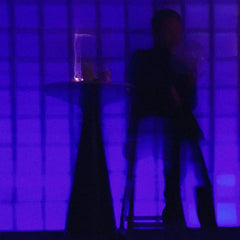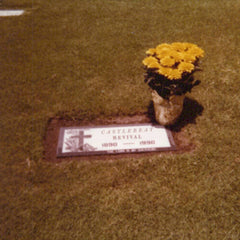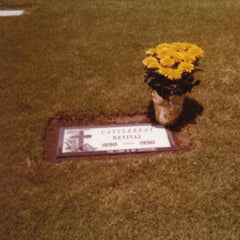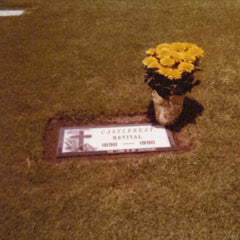Edith Judith // Bones & Structure LP / TAPE
- Availability:
アメリカ・シカゴのインディーフォークデュオEdith Judith が、2022年10月に同国NYのインディーポップレーベルRuination Recordsからリリースしたアルバムです。(レコードは2023年6月リリース)
ポストロックリスナーにもアプローチするインディーフォーク10曲を収録。DLコード付属。
レーベルその他作品はこちら /// Click here to see more Ruination Records releases available at Tobira.
--------------------------------
Includes DL code.
Essay by Ruination Records:
"“We’re not going anywhere,” Katie Ernst (Twin Talk, Jason Moran) sings on “Bridge,” a dreamy standout on Edith Judith’s debut album, Bones & Structure. As the music burbles softly around her—a deftly plucked guitar theme, a drumbeat that alternates between keeping and disrupting time, a saxophone that swims in and out of earshot—she gives no clue whether that statement should comfort or concern the listener. It’s a line laden with competing meanings, as though neither she nor Dustin Laurenzi (Jeff Parker, Twin Talk, Bon Iver, Macie Stewart), the other half of Edith Judith, has ever settled on the song’s true intentions. Without sounding vague or detached, this Chicago-based duo thrives on such ambiguity, creating songs that are open-ended, unsettled, alive to as many implications as a listener brings to them.
“Are we not going anywhere because we’re such a strong unit?” Ernst poses. “Or are we not going anywhere because it’s a dead end? The many meanings that a word can have is something that is incredibly compelling to me personally, and I try to let people take whatever they need from a song without imposing too much of an agenda.” Ernst and Laurenzi have explored such musical ambiguity in their other musical projects, but Edith Judith sharpens their talent for creating catchy, thoughtful songs that sound straightforward on their surface but reveal new possibilities with each listen.
Perhaps that comes from writing during a period of intense uncertainty. Ernst and Laurenzi started the band in their Chicago apartment during the first months of the pandemic, which certainly adds another twist to the phrase, “We’re not going anywhere.” “We were in this weird time when you didn’t know what was going on,” says Ernst. “Was it good to get a time out from life? Or were we all gonna die? You can swim in that ambiguity.”
They passed the hours making music that isn’t about that period but certainly reflects many of those worries. Laurenzi passed the long lockdown hours in the couple’s music room, tinkering with instruments and experimenting with textures, molding guitars and synths and sounds that remain unidentifiable into a curious soundscape. When he played the track for Ernst, she immediately sensed melodic lines within the music, which eventually suggested lyrics and big ideas. “Strange” was the first of several songs they wrote separately together. “We had a very specific routine,” he says. “I would record something, then I’d pass it along to Katie and she’d make a melody and write lyrics. Then we’d build from that. It was very structured, which makes sense in all that chaos.”
Even as they created several more songs in similar fashion, they tried not to pin too many expectations to the music or what it might become. They’ve spent the last decade playing together in Twin Talk—her playing double bass and singing, him playing a variety of reed instruments—but it was immediately clear that this was something different. “As far as the two of us working together,” says Ernst, “this was a new frontier. We gave ourselves time, we weren’t in a rush, because there was nothing to rush for. So we both had our own time to do our own thing without any compromises or restraints. I trusted that Dustin wasn’t going to add 400 clarinets just for kicks. Everything we added felt important. There was a certain discipline to it.”
Four songs into this mysterious endeavor, they decided to share the songs with their friend Ben Lumsdaine, a Los Angeles drummer and producer who plays with Laurenzi in the group Snaarj. Lumsdaine sent back contributions that didn’t just keep time or add a beat, but commented on what Ernst was singing and what Laurenzi was playing. His pots-and-pans percussion lends “Hot Lava” its lively pace, and his rhythms on opener “Carry” grow increasingly frantic as the song progresses, keeping the music slightly off balance.
“What Ben sent back to us was very different from what we expected,” says Ernst. “The songs had more bite, a little more edginess alongside the softness of the original recordings. You could tell he put the same kind of neurotic care into them that we did.” The project felt like a real band, and the couple named it after their beloved three-legged dog, who is, as Ernst says, “a character of great resilience in our lives.” Gradually, an album took shape, taking the music in all new directions. “As things went on, we started adding more synth sounds to it,” says Laurenzi. “It became dreamier, more surreal.”
The music conveys a sense of quiet wonder at the world, even if that world had shrunk to the size of their apartment. Edith Judith muses on the quality of light in a certain room (“Strange”), the passage of DNA from parent to child (“Carry”), the illusion of an afterlife (closer “Worrisome, Weary”). With its stairstep fanfare, thundering percussion, and Ernst’s prismatic vocals, “Luna” gazes at the night sky and noticed the moon drifting farther and farther from the Earth. “I looked up some facts about the moon and just turned them into a song,” she says. “We have just one moon, but it’s slowly moving away from us, which makes me sad. The song became this celestial love story. You get a little mushy during times of trouble.”
While Edith Judith was born during uncertain times, the band is not merely a pandemic project. It has become its own distinct entity, an ongoing collaboration between two imaginative musicians who bring out something unique in each other. It’s not the only music the couple make together, but a specific corner of their shared world. “We didn’t go into this looking for answers or trying to be sure about anything,” says Ernst. “These are love songs and question songs, hopeful songs and sad songs. They’re poems of uncertainty.”"
Artist : Edith Judith
Label : Ruination Records
アメリカ・シカゴのインディーフォークデュオEdith Judith が、2022年10月に同国NYのインディーポップレーベルRuination Recordsからリリースしたアルバムです。(レコードは2023年6月リリース)
ポストロックリスナーにもアプローチするインディーフォーク10曲を収録。DLコード付属。
レーベルその他作品はこちら /// Click here to see more Ruination Records releases available at Tobira.
--------------------------------
Includes DL code.
Essay by Ruination Records:
"“We’re not going anywhere,” Katie Ernst (Twin Talk, Jason Moran) sings on “Bridge,” a dreamy standout on Edith Judith’s debut album, Bones & Structure. As the music burbles softly around her—a deftly plucked guitar theme, a drumbeat that alternates between keeping and disrupting time, a saxophone that swims in and out of earshot—she gives no clue whether that statement should comfort or concern the listener. It’s a line laden with competing meanings, as though neither she nor Dustin Laurenzi (Jeff Parker, Twin Talk, Bon Iver, Macie Stewart), the other half of Edith Judith, has ever settled on the song’s true intentions. Without sounding vague or detached, this Chicago-based duo thrives on such ambiguity, creating songs that are open-ended, unsettled, alive to as many implications as a listener brings to them.
“Are we not going anywhere because we’re such a strong unit?” Ernst poses. “Or are we not going anywhere because it’s a dead end? The many meanings that a word can have is something that is incredibly compelling to me personally, and I try to let people take whatever they need from a song without imposing too much of an agenda.” Ernst and Laurenzi have explored such musical ambiguity in their other musical projects, but Edith Judith sharpens their talent for creating catchy, thoughtful songs that sound straightforward on their surface but reveal new possibilities with each listen.
Perhaps that comes from writing during a period of intense uncertainty. Ernst and Laurenzi started the band in their Chicago apartment during the first months of the pandemic, which certainly adds another twist to the phrase, “We’re not going anywhere.” “We were in this weird time when you didn’t know what was going on,” says Ernst. “Was it good to get a time out from life? Or were we all gonna die? You can swim in that ambiguity.”
They passed the hours making music that isn’t about that period but certainly reflects many of those worries. Laurenzi passed the long lockdown hours in the couple’s music room, tinkering with instruments and experimenting with textures, molding guitars and synths and sounds that remain unidentifiable into a curious soundscape. When he played the track for Ernst, she immediately sensed melodic lines within the music, which eventually suggested lyrics and big ideas. “Strange” was the first of several songs they wrote separately together. “We had a very specific routine,” he says. “I would record something, then I’d pass it along to Katie and she’d make a melody and write lyrics. Then we’d build from that. It was very structured, which makes sense in all that chaos.”
Even as they created several more songs in similar fashion, they tried not to pin too many expectations to the music or what it might become. They’ve spent the last decade playing together in Twin Talk—her playing double bass and singing, him playing a variety of reed instruments—but it was immediately clear that this was something different. “As far as the two of us working together,” says Ernst, “this was a new frontier. We gave ourselves time, we weren’t in a rush, because there was nothing to rush for. So we both had our own time to do our own thing without any compromises or restraints. I trusted that Dustin wasn’t going to add 400 clarinets just for kicks. Everything we added felt important. There was a certain discipline to it.”
Four songs into this mysterious endeavor, they decided to share the songs with their friend Ben Lumsdaine, a Los Angeles drummer and producer who plays with Laurenzi in the group Snaarj. Lumsdaine sent back contributions that didn’t just keep time or add a beat, but commented on what Ernst was singing and what Laurenzi was playing. His pots-and-pans percussion lends “Hot Lava” its lively pace, and his rhythms on opener “Carry” grow increasingly frantic as the song progresses, keeping the music slightly off balance.
“What Ben sent back to us was very different from what we expected,” says Ernst. “The songs had more bite, a little more edginess alongside the softness of the original recordings. You could tell he put the same kind of neurotic care into them that we did.” The project felt like a real band, and the couple named it after their beloved three-legged dog, who is, as Ernst says, “a character of great resilience in our lives.” Gradually, an album took shape, taking the music in all new directions. “As things went on, we started adding more synth sounds to it,” says Laurenzi. “It became dreamier, more surreal.”
The music conveys a sense of quiet wonder at the world, even if that world had shrunk to the size of their apartment. Edith Judith muses on the quality of light in a certain room (“Strange”), the passage of DNA from parent to child (“Carry”), the illusion of an afterlife (closer “Worrisome, Weary”). With its stairstep fanfare, thundering percussion, and Ernst’s prismatic vocals, “Luna” gazes at the night sky and noticed the moon drifting farther and farther from the Earth. “I looked up some facts about the moon and just turned them into a song,” she says. “We have just one moon, but it’s slowly moving away from us, which makes me sad. The song became this celestial love story. You get a little mushy during times of trouble.”
While Edith Judith was born during uncertain times, the band is not merely a pandemic project. It has become its own distinct entity, an ongoing collaboration between two imaginative musicians who bring out something unique in each other. It’s not the only music the couple make together, but a specific corner of their shared world. “We didn’t go into this looking for answers or trying to be sure about anything,” says Ernst. “These are love songs and question songs, hopeful songs and sad songs. They’re poems of uncertainty.”"
Artist : Edith Judith
Label : Ruination Records









